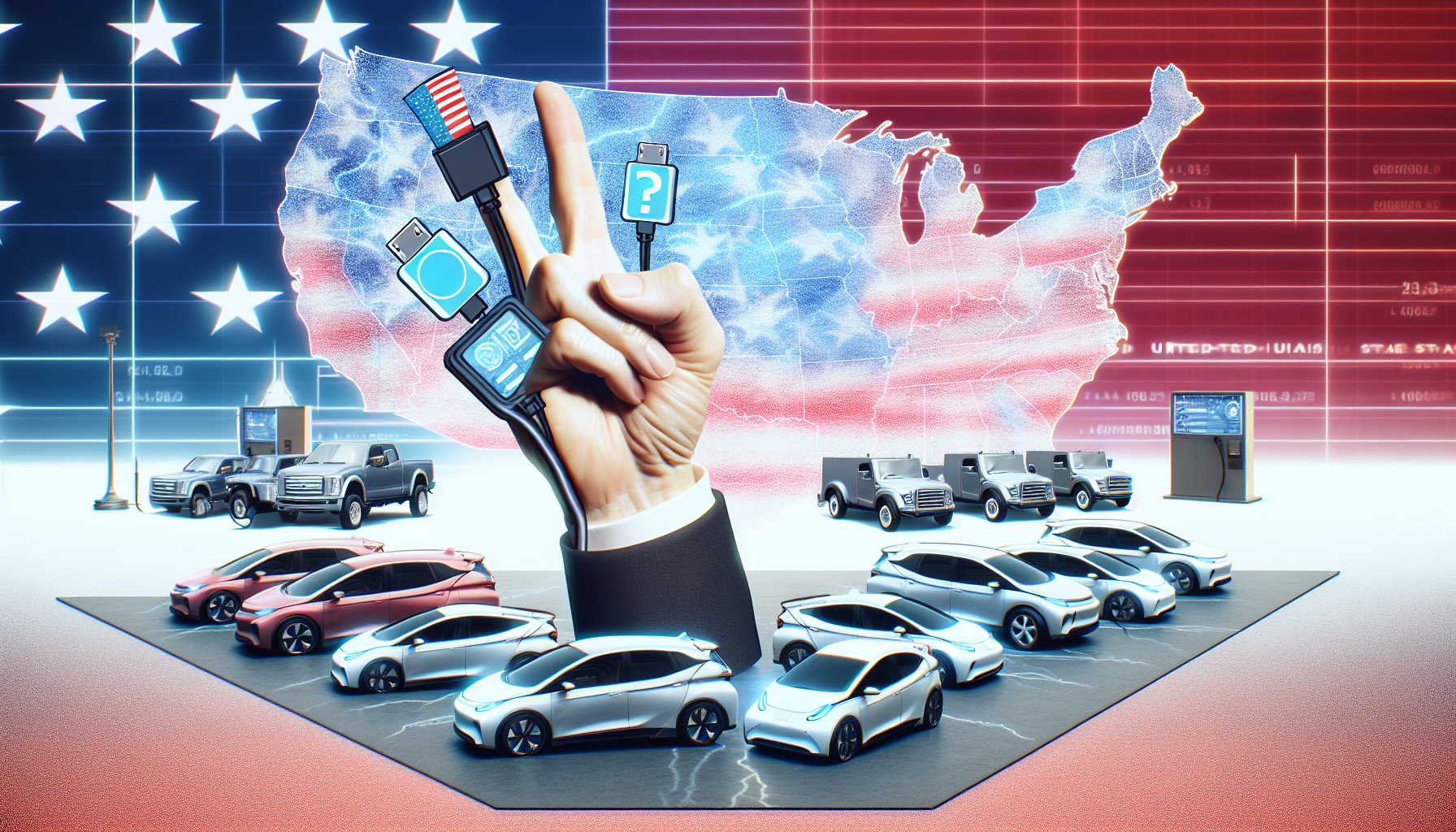Donald Trump Clinches 2024 US Election Win: What Implications Does It Hold for the Future of Electric Vehicles?
We independently review everything we recommend. When you buy through our links, we may earn a commission which is paid directly to our Australia-based writers, editors, and support staff. Thank you for your support!
Quick Summary: Main Points
- Donald Trump’s potential re-election in 2024 might significantly impact the electric vehicle (EV) market.
- A proposed rollback of EV tax benefits and subsidies could reduce the financial attractiveness of EVs for buyers.
- Efforts to enhance the EV charging network may encounter budget cuts or reallocation of resources.
- Trump’s administration might ease up on vehicle emissions regulations, lessening the pressure on manufacturers to switch to EV technology.
- Elon Musk’s connection with Trump might lead to unique benefits for Tesla.
- Global dynamics in the EV market might shift, with the U.S. possibly falling behind in EV leadership.
The Impact of Trump on EV Regulations
The re-election of Donald Trump in 2024 introduces a phase of unpredictability for the electric vehicle (EV) industry. Trump has historically shown skepticism towards EVs and their supporting policies. In his previous term, he frequently criticized the limitations associated with EVs and raised doubts regarding the need for governmental financial support.
With his possible return to the presidency, there are indications that Trump could reconsider or reverse the EV tax benefits established during the Biden administration. These incentives have been crucial in making electric vehicles more accessible to the public. A decrease in these subsidies could lessen the financial incentives for consumers to invest in EVs, potentially stunting the industry’s advancement.
Moreover, Trump’s administration may reassess the financial support intended for the development of EV charging infrastructure. Considerable capital has been invested in creating a nationwide network for EV chargers, but under Trump’s leadership, this budget could be reduced or redirected to different initiatives. This could hinder the accessibility and reliability of EVs, making them less appealing to users who depend on a solid charging infrastructure for daily operations.
In addition, Trump has indicated a tendency to relax vehicle emissions regulations. This could result in manufacturers feeling less urgency to transition from traditional combustion engines to electric alternatives. Yet, there remains a variable in this scenario — Elon Musk.

The Role of Elon Musk
Intriguingly, Elon Musk, the CEO of Tesla and a key player in the EV domain, backed Trump throughout his campaign. This association could yield unforeseen results for the EV industry, notably for Tesla. Musk’s strong interest in the prosperity of electric vehicles might advocate for a policy landscape that allows Tesla to flourish despite overall reductions in EV-friendly initiatives.
Musk’s connection could facilitate specific benefits for Tesla, such as ongoing access to tax incentives or advantageous trade policies. Tesla’s operations rely heavily on a sound supply chain for battery resources and other essential EV components. If Musk can leverage his relationship with Trump to obtain favorable trade terms, it might aid Tesla in retaining its competitive advantage even amidst a political climate less inclined toward EVs.

Market Responses
The electric vehicle market is expected to witness initial volatility as investors react to the shifting political context. Given Trump’s track record of loosening environmental regulations, some investors might predict a deceleration in the U.S. adoption of electric vehicles, leading to declines in stock valuations for various EV firms.
However, Tesla may stand out from this trend. Musk’s relationship with Trump could afford Tesla a distinct advantage, maintaining its stock price stability or even promoting growth. Tesla’s strong brand recognition and established market share could position it to endure potential setbacks from government incentive reductions or policy shifts.
The larger EV sector, however, might not be as robust. A decline in financial incentives could dampen consumer enthusiasm for electric vehicles, especially for automakers lacking Musk’s influence or Tesla’s solid market position.
Worldwide Effects
Trump’s policies could carry significant repercussions for the international EV market. While the U.S. has led the charge in the EV sector, largely due to companies like Tesla, a withdrawal of incentives and infrastructure support might lead it to cede dominance to countries that are actively promoting electric transportation.
European and Asian nations, particularly China, have been making substantial investments in EV technology and infrastructure. If the U.S. lags in its transition to EVs, it risks falling behind in the global EV supremacy battle. Additionally, Trump’s imposition of tariffs could impact vehicles produced abroad, especially those built in countries like Mexico. Nevertheless, Musk’s rapport with Trump might result in trade policies that favor Tesla’s interests worldwide.
Final Thoughts
Donald Trump’s anticipated election win in 2024 raises critical queries regarding the future of the electric vehicle landscape. His policies may generally trend against EV support, yet his ties with Elon Musk introduce a complicating factor. Tesla might navigate these changes unscathed or could even gain from special provisions, whereas the wider EV market may struggle with diminished incentives and lack of infrastructure backing.
The forthcoming years will be pivotal for industry stakeholders as they adapt to this evolving scenario. The manner in which Trump’s administration manages domestic policies alongside Musk’s global aspirations will significantly influence the direction of electric vehicles both in the U.S. and internationally.
Synopsis
Donald Trump’s potential re-election in 2024 has the capability to profoundly affect the future of the electric vehicle (EV) arena in the U.S. Given his skepticism towards electric vehicles and environmental measures, Trump’s administration may withdraw key financial incentives and cut support for EV infrastructure. Conversely, Elon Musk’s impact could ensure Tesla thrives in this environment, perhaps leading to tailored policy exceptions in favor of the company. The global ramifications of Trump’s policies might see the U.S. falling behind in the EV competition, particularly as other countries maintain robust EV initiatives.
Q&A: Your Inquiries Addressed
Q: What impact might Trump’s re-election have on EV tax incentives?
A:
Trump has consistently been critical of government subsidies for electric vehicles. His administration could reverse or reduce the EV tax incentives implemented during the Biden administration, leading to higher costs for consumers and possibly hindering EV adoption.
Q: Will the expansion of EV charging infrastructure continue during Trump’s presidency?
A:
There is a chance that Trump’s administration may slash or redirect funding intended for EV charging infrastructure. This could delay the establishment of a national charging network, rendering EVs less practical for users needing widespread access to charging stations.
Q: How is Tesla affected by Elon Musk’s relationship with Trump?
A:
Elon Musk’s endorsement of Trump might result in tailored policy adjustments favoring Tesla. This could encompass ongoing access to specific tax incentives or beneficial trade arrangements that allow Tesla to sustain its competitive edge in the EV marketplace.
Q: What changes can be expected regarding vehicle emissions standards under Trump?
A:
Trump’s administration is expected to ease vehicle emissions standards, reducing regulatory pressures on manufacturers to transition to electric vehicles. This development could decelerate the industry’s overall shift toward electric models.
Q: Will Trump’s policies jeopardize the U.S.’s leading position in the global EV market?
A:
Indeed, Trump’s policies could result in the U.S. losing its standing in the global EV landscape, especially as other nations such as China and those in the European Union aggressively invest in EV technology and infrastructure.
Q: Is Tesla’s stock likely to be affected by Trump’s re-election?
A:
While the overall EV sector could see fluctuations, Tesla might remain resilient due to Musk’s relationship with Trump. Investors could view Tesla as being in a better position to manage policy changes, potentially keeping its stock stable or even increasing its value.
Q: What are the longer-term consequences for the EV industry?
A:
The long-term impact hinges on the trajectory of Trump’s policies. Should the cuts to incentives and infrastructure support persist, the U.S. may lag in electric vehicle acceptance. However, companies like Tesla may continue to thrive due to their strong market presence and relationships with key policymakers.
